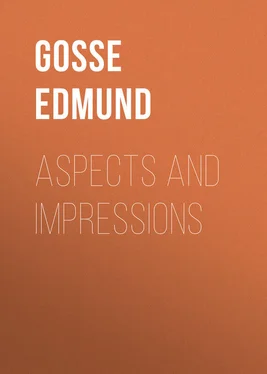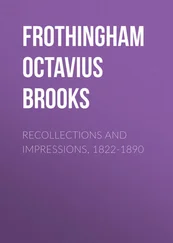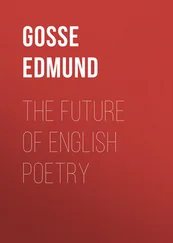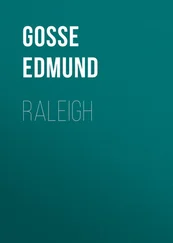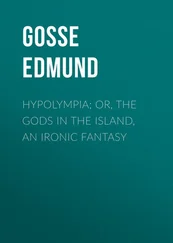Edmund Gosse - Aspects and Impressions
Здесь есть возможность читать онлайн «Edmund Gosse - Aspects and Impressions» — ознакомительный отрывок электронной книги совершенно бесплатно, а после прочтения отрывка купить полную версию. В некоторых случаях можно слушать аудио, скачать через торрент в формате fb2 и присутствует краткое содержание. Жанр: Критика, foreign_antique, foreign_prose, на английском языке. Описание произведения, (предисловие) а так же отзывы посетителей доступны на портале библиотеки ЛибКат.
- Название:Aspects and Impressions
- Автор:
- Жанр:
- Год:неизвестен
- ISBN:нет данных
- Рейтинг книги:4 / 5. Голосов: 1
-
Избранное:Добавить в избранное
- Отзывы:
-
Ваша оценка:
- 80
- 1
- 2
- 3
- 4
- 5
Aspects and Impressions: краткое содержание, описание и аннотация
Предлагаем к чтению аннотацию, описание, краткое содержание или предисловие (зависит от того, что написал сам автор книги «Aspects and Impressions»). Если вы не нашли необходимую информацию о книге — напишите в комментариях, мы постараемся отыскать её.
Aspects and Impressions — читать онлайн ознакомительный отрывок
Ниже представлен текст книги, разбитый по страницам. Система сохранения места последней прочитанной страницы, позволяет с удобством читать онлайн бесплатно книгу «Aspects and Impressions», без необходимости каждый раз заново искать на чём Вы остановились. Поставьте закладку, и сможете в любой момент перейти на страницу, на которой закончили чтение.
Интервал:
Закладка:
In the letters from Butler to his family, written at school and at college, there is, however, no trace of the violent antagonism which he afterwards believed that he had always felt. It is true that a boy who writes to his father and mother, and indeed in similar circumstances a man too, is constrained to resign himself to a certain innocent hypocrisy. Very few children are able to send to their parents, and very few parents are able to endure from their children, a perfectly sincere description of their crude sentiments during adolescence. But if Samuel Butler was really tormented at home, as Ernest Pontifex was, it is odd that some note of hostility should not have crept into his juvenile correspondence. However, Mr. Festing Jones, who is as judicious as a Lord of Appeal, seems to entertain no doubt that Canon Butler was a holy horror, so that we must bow to his opinion.
The earliest overt evidence of a falling out between father and son is delayed until, in Mr. Jones's unfaltering narrative, we reach the son's twenty-third year. He does not seem, at first, to have combated his father's obstinate demand that he should take orders in the Church of England. That Canon Butler, a clergyman of clergymen, should have desired to see his Samuel take this step, ought not to seem unreasonable, though it certainly proved unlucky. In the novel, it will be remembered, Ernest Pontifex actually was ordained, but to this length Samuel Butler never proceeded. He went to a parish in the east of London to work with a parson who had been one of his grandfather's pupils at Shrewsbury. There his faith in the efficacy of infant baptism was shaken, and presently falling, brought down about his ears the whole fabric of Simeonite Christianity in which he had so assiduously been trained. He suddenly, and no doubt abruptly, wrote to the Canon and said that he "declined to be ordained." From a carnal as well as a spiritual point of view this must have been a nasty shock for his parents, and Mr. Festing Jones tells us "there was a long and painful correspondence." This he mercifully spares us, but refers us to The Way of All Flesh , where Butler made dauntless use of it.
The financial situation was difficult. Canon Butler was fairly well-to-do, but he had other children to provide for, and Samuel, who refused to be a clergyman, went on refusing, as it must have seemed to his father, to be anything at all. Like the poet Cowley, he
neither great at Court nor in the War,
Nor at the Exchange would be, nor at the wrangling Bar.
All professions were suggested, and each in vain. At last it was decided that Samuel should emigrate to New Zealand, and become a sheep farmer. Only nine years earlier, a Church of England colony had been founded at Canterbury, in the South Island, and the town of Christchurch had been founded. It had enjoyed a great success, and by the year 1859, when Butler landed, almost all the sheep lands had been already taken up. At last he found an unoccupied run at the "back of beyond," and built a little homestead for himself, which he called Mesopotamia. It is needless to dwell on this episode of Butler's life, further than to point out that it proved him capable of sustained physical industry and of considerable financial adroitness. The remainder of his career hardly suggests the possession of either. The New Zealand episode is sufficiently dealt with in Butler's own book, A First Year in Canterbury Settlement , which, by the way, shows no trace of the author's subsequent merit as a writer. In June, 1864, he sailed homeward from the port of Lyttelton, but not alone, and we now approach the strangest incident of his life.
It was to be expected that the £4,400 which Butler had received from his father in 1859 would by this time have dwindled to zero. Not at all; it had swelled to £8,000. But just before he left New Zealand a young man, called Charles Pauli, whom he had known but very slightly as a journalist in Christchurch, and who had no claim upon Butler of any sort or species, came to him and asked him to pay for his passage back to England, and to advance him £200 a year for three years. "To me," wrote Butler in 1897, "in those days this seemed perfectly easy; and Pauli, I have not the smallest doubt, intended and fully believed – for his temperament was always sanguine – that he should be able to repay me." Butler had very little insight into the "temperament" of Pauli, and the whole of the extraordinary story increases our conviction that this sardonic and sarcastic analyst of imaginary life was as powerless as a child in face of reality. The dreadful Pauli adventure, told for the first time by Mr. Festing Jones, in his deliberate, unimpassioned way, is the most amazing revelation of simplicity traded upon by fraud that it is possible to imagine.
There soon proved to be a complete absence of harmony in the tastes of Butler and Pauli, who had really nothing in common. Yet they settled together, when they arrived in London, in rooms in Clifford's Inn, Fleet Street. There Butler lived for all the rest of his life, thirty-eight years; but presently Pauli went elsewhere. Then the relations of the two became incomprehensible. Pauli was very irritable, and constantly found fault with Butler. He refused to let Butler know his address, and yet was continually sponging upon him. He said that he could get no help from his own parents, and that Butler stood between him and starvation. For three years Pauli did not attempt to work. At last, in 1867, he was called to the Bar. He lunched with Butler three times a week, when he always said that he was earning nothing. Butler's own statement, written in 1898, the year after Pauli's death, is as follows:
I have no means of ascertaining how much Pauli had from me between the years 1864 and 1881 (but it exceeded £3,500). I kept no accounts; I took no receipts from him; the understanding was that he would repay me when he came into his reversion… In 1879 I only admitted to my father having helped Pauli from time to time; the fact was, I had done everything… I had more than shared every penny I had with him, but I believed myself to be doing it out of income, and to have a right to do it.
Throughout the long periods in which Butler was hard pressed for sufficient money to exist – times in which there were painful and unseemly squabbles about an allowance between his father and himself – he was supporting Pauli, whose means of subsistence he took no pains to investigate, and who, in full cognition of Butler's attenuated sources of income, punctually took half for himself. Mr. Festing Jones's statement is amazing:
Pauli was called to the Bar in 1867, and took chambers in Lincoln's Inn for his work. He told Butler where they were, so that he could write if he had any communication to make to him that would not wait till they met; but Butler was not to go there. Of course, he could have gone, but he did not. He could have found out in a hundred ways where Pauli lived if he had set about it; but, knowing that Pauli did not wish it, he did nothing.
At last, in 1897, after having shared his poverty with this strange friend for thirty-three years, Butler read in The Times that Pauli was dead. Then, at last, he made inquiries, and found that for a great many years past Pauli's income from the law had exceeded £700 a year, and for nearly twenty had been over £1,000. Pauli left £9,000, not a penny of it to Butler, whose parasite he had been for the greater part of his life, when every five-pound note was of consequence to Butler. One knows not which to be more astounded at – heartless greediness on the one side, or fatuous simplicity on the other. When all the evidence came out at last beyond all further concealment, Butler wrote: "I understand now why Pauli preserved such an iron silence when I implored him to deal with me somewhat after the fashion in which I had dealt with him." [That is to say, in telling him precisely what Butler's exact financial position was.] "The iniquity of the whole thing, as it first struck me in full force, upset me."
Читать дальшеИнтервал:
Закладка:
Похожие книги на «Aspects and Impressions»
Представляем Вашему вниманию похожие книги на «Aspects and Impressions» списком для выбора. Мы отобрали схожую по названию и смыслу литературу в надежде предоставить читателям больше вариантов отыскать новые, интересные, ещё непрочитанные произведения.
Обсуждение, отзывы о книге «Aspects and Impressions» и просто собственные мнения читателей. Оставьте ваши комментарии, напишите, что Вы думаете о произведении, его смысле или главных героях. Укажите что конкретно понравилось, а что нет, и почему Вы так считаете.
